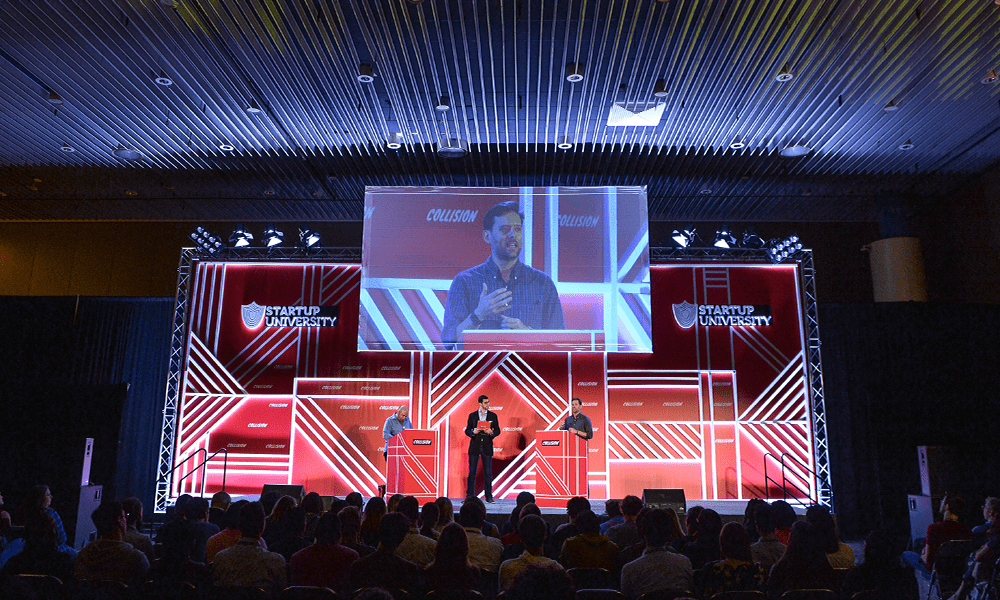How can technology address the climate crisis? Find out at Collision 2019
By Nick Zarzycki | April 10, 2019

UN diplomat Christiana Figueres inherited a seemingly impossible task when she took over the United Nations’ climate change agenda in 2010.
“The global mood on climate change was in the trash can,” she told the audience at TED 2016 in Vancouver. “No one believed that a global agreement could ever be possible. In fact, neither did I.”
Five years later, 195 countries representing more than 87 per cent of global greenhouse gas emissions signed the historic Paris Agreement. What changed? Figueres said it was the rapid ascent of clean technologies that tipped the scales.
“With this shift in technologies, there was a shift in the economic equation. We were able to recognize that the dissemination of clean technologies is going to bring us cleaner air, better health, [and] more livable cities. In sum, a better world than what we have now.”
This May, Figueres and a number of global climate advocates will descend on Toronto for Collision, one of the world’s biggest technology conferences, to discuss how clean technologies can help us stave off climate disaster.
Headlined last year by former vice-president Al Gore, this year’s edition of the planet : tech track at Collision promises to be a can’t-miss event for anyone working in the cleantech space.
Here’s a preview of who you can expect to see at this year’s conference.
Christiana Figueres, convenor, Mission 2020
As if co-ordinating the world’s first legally-binding climate agreement wasn’t impressive enough, Figueres has now set her sights on an even bigger challenge: peaking the world’s greenhouse emissions by 2020.
That’s the primary goal of Mission 2020, a global campaign to accelerate the adoption of renewables, curb deforestation and push investment in climate action beyond $1 trillion per year.
“There is nothing opaque about this new data,” Figueres told the Guardian last year after the release of the most recent Intergovernmental Panel on Climate Change report, which argues that governments must ramp up decarbonization efforts to stave off climate disaster.
“Emissions reductions today are much more important than emissions reductions tomorrow. The sooner we bend the curve of global emissions, the more options we will have on the table for safely reaching the necessary, desirable and achievable carbon neutrality by 2050.”
Kevin Conrad, executive director, Coalition for Rainforest Nations
Big polluters have always been an obstacle in the fight against climate change. Just ask Papua New Guinea representative Kevin Conrad, who garnered international headlines in 2007 after singlehandedly facing down U.S. diplomats at a climate conference in Bali.
“If for some reason you’re not willing to lead, leave it to the rest of us. Please get out of the way,” Conrad told American delegates who threatened to derail the talks, causing the conference floor to erupt in applause.
Today, Conrad continues to stand up to big polluters as head of the Coalition for Rainforest Nations, which seeks to compensate villagers living in tropical countries for conserving natural rainforests.
“How do we manage the relationship between governments, industry and people? Our observation, from the beginning, has been that you have to start with the people,” Conrad told the audience at the B4E in 2009. “Then it becomes a question of, how does a government set up a positive incentive system that leads to sustainable outcomes?”

Canada’s cleantech ecosystem
Canadian clean technology entrepreneurs have surged ahead in recent years.
Canada currently finds itself in the middle of a clean technology boom, with more than 800 cleantech companies employing over 55,000 people in the sector.
MaRS Cleantech managing director Jon Dogterom says that makes Toronto an ideal setting for the Collision conference, where thousands of Canadian entrepreneurs will meet with international investors, journalists and multinationals.
“Canada has an incredible ecosystem and support network for growing and scaling cleantech companies,” says Dogterom.
“We are exceeding expectations in all the international rankings in cleantech innovation. Most recently, for the second year in a row, we owned 12% of the Cleantech 100 list [a ranking of the world’s top cleantech companies]. Looking at the size of Canada, that far exceeds what you would expect from us.”
Jesse Moore, Co-founder & CEO, M-KOPA
Among the Canadian cleantech entrepreneurs in attendance will be headline speaker, Torontonian and M-KOPA Solar founder Jesse Moore, whose company—which was named to this year’s Cleantech 100 list—helps consumers in rural Kenya save money by replacing kerosene with affordable renewable energy.
“Our clean technology is connecting homes and businesses, so millions of people can bypass expensive and unreliable services,” Moore Collision earlier this year. “As well as the environmental gains of moving to clean power, our customers can upgrade their lives and economic prospects by accessing finance for a range of productive appliances.”
Figueres, Conrad and Moore will all speak at Collision, one of the world’s biggest tech conferences, in Toronto in May. The conference will draw over 25,000 global attendees to the city for four days of programming across 15 tracks.
 Nick Zarzycki
Nick Zarzycki